Marsa Alam
Marsa Alam (Arabic: مَرْسَىٰ عَلَم Marsā ʿAlam [ˈmæɾsæ ˈʕælæm], Classical Arabic lit. 'Anchorage Mountain') is a tourist town in south-eastern Egypt, located on the western shore of the Red Sea. It is currently seeing fast increasing popularity as a tourist destination and development following the opening of Marsa Alam International Airport in 2003. Marsa Alam is considered one of the newly established towns, as its development began in 1995 through the investments of Kuwaiti Al-Kharafi Group, which Established the town with all its facilities, resorts and infrastructure, to make Marsa Alam one of the most attractive places in Egypt for tourism. The town is located on an area of 38,433 km2, 274 km south of Hurghada, and 134 km south of Qusayr, and its 60 meters above sea level. It is inhabited by about 11,497 residents. [2][3][4][5]
Marsa Alam
مرسى علم | |
|---|---|
.jpg.webp) 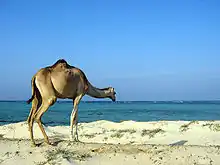 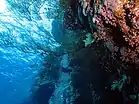 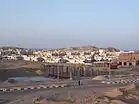 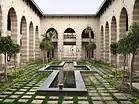 Overview of Marsa Alam | |
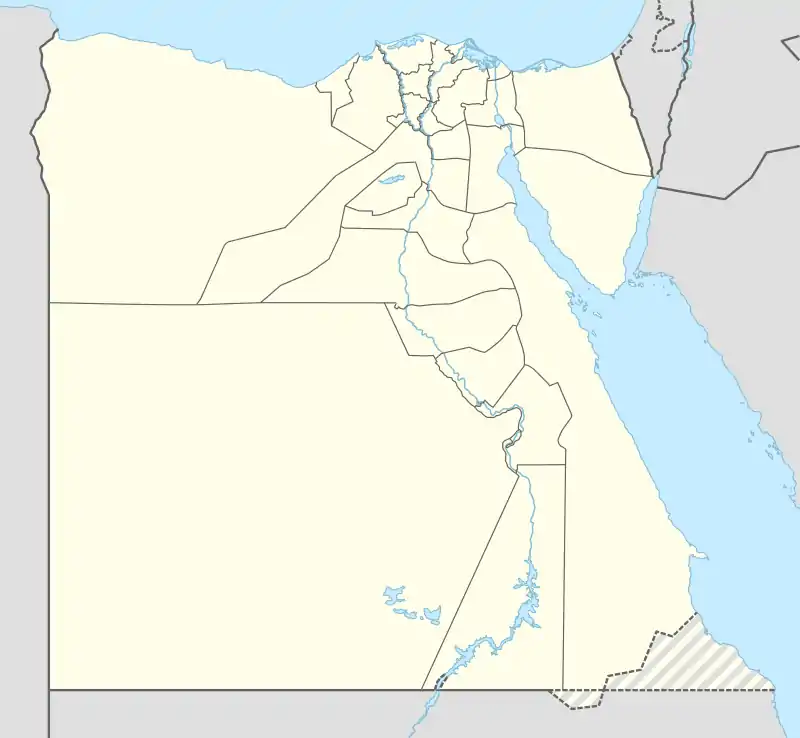 Marsa Alam Location in Egypt | |
| Coordinates: 25°04′N 34°54′E | |
| Country | |
| Governorate | Red Sea Governorate |
| Area | |
| • Total | 5,476 sq mi (14,184 km2) |
| Elevation | 59 ft (18 m) |
| Population (2021)[1] | |
| • Total | 9,001 |
| • Density | 1.6/sq mi (0.63/km2) |
| Time zone | UTC+2 (EST) |
Due to its crystal clear water and its white sandy beaches, it is also known as the "Egyptian Maldives".[6][7]
Among the most famous beaches around Marsa Alam is the Abu Dabab beach. In Abu Dabab, turtles are a common sight. For tourists who seek to see something less typical, there is marine wildlife like crocodilefish and octopuses.
Marsa Alam is also known as the world-class kitesurfing destination and starting point for safaris.[8]
Marsa Alam also has some inland attractions, such as the Emerald Mines and the Temple of Seti I at Khanais.
Climate
Despite being over 135 miles (217 km) north of the tropical zone, the city experiences a tropical hot desert climate (Köppen: BWh),[9] with steadier temperatures than places to the north such as Hurghada and Sharm el Sheikh, yet Kosseir is steadier and has cooler summers. Marsa Alam, Kosseir and Sharm el-Sheikh have the warmest night temperatures of all other Egyptian cities and resorts. Average maximum temperatures during January typically range from 22 to 25 °C (72 to 77 °F) and in August 33 to 40 °C (91 to 104 °F).
The temperature of the Red Sea at this location during the year ranges from 22 to 29 °C (72 to 84 °F).[10]
The highest record temperature was 45 °C (113 °F), recorded on May 10, 2010, while the lowest record temperature was 5 °C (41 °F), recorded on January 3, 2008.[11]
| Climate data for Marsa Alam | |||||||||||||
|---|---|---|---|---|---|---|---|---|---|---|---|---|---|
| Month | Jan | Feb | Mar | Apr | May | Jun | Jul | Aug | Sep | Oct | Nov | Dec | Year |
| Record high °C (°F) | 29 (84) |
32 (90) |
35 (95) |
39 (102) |
45 (113) |
43 (109) |
43 (109) |
42 (108) |
39 (102) |
38 (100) |
34 (93) |
31 (88) |
45 (113) |
| Average high °C (°F) | 24.1 (75.4) |
25.1 (77.2) |
26.9 (80.4) |
29.8 (85.6) |
33.1 (91.6) |
34.7 (94.5) |
35.5 (95.9) |
35.6 (96.1) |
34.2 (93.6) |
32.6 (90.7) |
29.3 (84.7) |
25.5 (77.9) |
30.5 (87.0) |
| Daily mean °C (°F) | 18.6 (65.5) |
19.4 (66.9) |
21.4 (70.5) |
24.2 (75.6) |
27.9 (82.2) |
29.5 (85.1) |
30.5 (86.9) |
30.8 (87.4) |
29.3 (84.7) |
27.4 (81.3) |
24.0 (75.2) |
20.1 (68.2) |
25.3 (77.5) |
| Average low °C (°F) | 13.2 (55.8) |
13.8 (56.8) |
15.9 (60.6) |
18.7 (65.7) |
22.7 (72.9) |
24.3 (75.7) |
25.5 (77.9) |
26.0 (78.8) |
24.4 (75.9) |
22.3 (72.1) |
18.7 (65.7) |
14.8 (58.6) |
20.0 (68.0) |
| Record low °C (°F) | 5 (41) |
8 (46) |
11 (52) |
15 (59) |
16 (61) |
19 (66) |
22 (72) |
20 (68) |
19 (66) |
15 (59) |
12 (54) |
10 (50) |
5 (41) |
| Average precipitation mm (inches) | 0 (0) |
0 (0) |
0 (0) |
0 (0) |
0 (0) |
0 (0) |
0 (0) |
0 (0) |
0 (0) |
1 (0.0) |
3 (0.1) |
1 (0.0) |
5 (0.1) |
| Average rainy days | 0 | 0 | 0 | 0 | 0 | 0 | 0 | 0 | 0 | 0 | 0 | 0 | 0 |
| Mean monthly sunshine hours | 279 | 283 | 310 | 330 | 372 | 390 | 403 | 372 | 330 | 310 | 300 | 279 | 3,958 |
| Source 1: Climate-Data.org,[9] Weather2Travel for sunshine and rainy days[12] | |||||||||||||
| Source 2: Voodoo Skies[11] and MarsaAlam.com[13] for record temperatures, HolidayCheck.com[10] | |||||||||||||
| Jan | Feb | Mar | Apr | May | Jun | Jul | Aug | Sep | Oct | Nov | Dec |
|---|---|---|---|---|---|---|---|---|---|---|---|
| 73 °F
23 °C |
72 °F
22 °C |
72 °F
22 °C |
73 °F
23 °C |
77 °F
25 °C |
81 °F
27 °C |
82 °F
28 °C |
84 °F
29 °C |
82 °F
28 °C |
81 °F
27 °C |
79 °F
26 °C |
75 °F
24 °C |
Wadi El Gemal Reserve

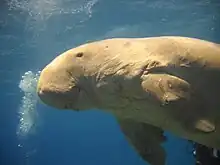
The Wadi El Gemal Reserve is located on an area of 7,450 km2, the land section of which extends for a distance of 4,770 km, while the marine section extends for a distance of 2,000 km2, and covers 60 km of the Red Sea coast and includes the Wadi El Gemal islands, coral reefs and seaweed clusters, in addition to Mount Hamata, which is located at the beginning of the reserve. A flowing freshwater source that mixes with seawater and forms a low-salinity marsh. The reserve is divided into several areas: the Wadi El Gemal Island area, which is the second largest concentration of the Sooty Falcon, the Hankawareb area, which is 18 km south of Wadi El Gemal and is characterized by beaches and coral reefs, and the Qalaan area, which is 9 km north of the village. Hamata, characterized by the presence of vast areas of mangrove and many types of endemic and migratory birds, the Hamata Islands area, which is located two miles from the beach opposite the village of Hamata and is characterized by places for practicing swimming and diving activities. The valley was given this name due to the presence of a plant in that area that is palatable to camels. Wildlife and marine life are active in the reserve, including mountain goat “ibex”, Dorcas gazelle, which is also known as the afri, the aril gazelle, which is one of the smallest and most common species of deer, Ibex, Antelope, more than 13 species of birds, including Sunset Falcon, and marine creatures that include four species of Sea crab, Dugong, green turtles, whale shark, mermaid fish, dolphin, and more than 13 species of small fish, as for plant communities It includes 141 species, including mangrove trees, swamp herbs, and doum palms. The area is not devoid of ruins, as the mountain embraces the Temple of Sket, located 60 km inside Wadi El Gemal. The reserve has four entrances, and three administrative offices have been established, in addition to a museum for the Ababda tribes in which the tools they use are displayed. Tribal women are also taught, marketed, and sold handicrafts. The Ministry of Environment provides patrols to implement the reserve law, the environmental law, and environmental monitoring.[14][15][16]
Transportation
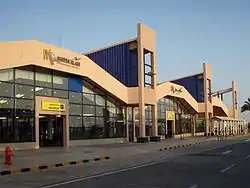
Marsa Alam Air Port
Work began on Marsa Alam Airport in March 1999, it was opened for commercial aviation on October 2001, and it was officially opened on October 2003 with a capacity of up to 600 passengers/hour. It was established with the aim of serving the coastal region in the south of Red Sea from the city of Al-Qusayr to the city of Marsa Alam, with a length of 120 km. The airport is 34 nautical miles northwest of Marsa Alam, and 210 km south of Hurghada. Flights coming from Italy, Germany, France and England for the purpose of tourism are active. The airport includes a passenger building located on an area of 5,000 square meters. The airport is managed and operated by IMAC Airport Management and Operations Company, one of the Kuwait Al-Kharafi Group, using the Build–operate–transfer system.[17]
Yacht Marina
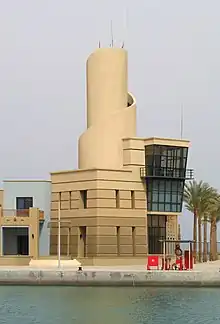
Marsa Alam Bahri Marina or Port Ghalib Marina is located 65 km north of Marsa Alam City, 75 km south of El Quseir City El Quseir, and 4 km south of Marsa Alam International Airport. Its total area is 315,872 m2, with a marine area of 277,872 m2, the length of its piers is 5,200 m2, and the ground area around the piers is 35,000 m2. The main activity of the marina is to receive foreign and local tourist yachts, and it operates 24 hours a day. It is frequented annually by an average of about 2,000 yachts, while its capacity reaches 1,050 yachts. The marina was established and managed by the Marsa Alam Tourism Development Company. The marina is equipped with yacht repair facilities, electronic navigation aids, ship waste reception facilities, yacht feeding units with fresh water, electricity and communications, refuelling services, security and safety tools, environmental preservation, fire and pollution control, as well as Provides guidance and assistance in docking yachts. It has a main navigational approach shaft, illuminated electronically at night, deep in the sea, 60 meters from the beginning of the navigational channel, to guide yachts coming to the port to approach and enter the navigational channel. [18][19]
References
- "Marsā 'Alam (Kism (urban and rural parts), Egypt) - Population Statistics, Charts, Map and Location". citypopulation.de. Retrieved 17 March 2023.
- "محمية وادي url". الهيئة المصرية للسياحة. Archived from the original on 28 September 2016. Retrieved 15 May 2016.
- "مرسى علم". الهيئة العامة للاستعلامات. Archived from the original on 10 October 2017. Retrieved 15 May 2016.
- دينا وادي (30 June 2004). "مرسى علم قرية صغيرة مصرية بمواصفات عالمية يمارس زوارها جميع أنواع السياحة". الشرق الأوسط. Archived from the original on 7 August 2018. Retrieved 15 May 2016.
- ميرفت رشاد (25 July 2010). "مرسى علم.. رحلة الاستمتاع تبدأ تحت مياه البحر الأحمر". ar:اليوم السابع. Archived from the original on 12 March 2018. Retrieved 15 May 2016.
- "In photos: Marsa Alam, Sharm el-Sheikh among 10 best beaches in Middle East – TripAdvisor". www.egyptindependent.com. Egypt Independent. 20 April 2017. Archived from the original on 23 Sep 2021.
With its crystal clear water and surreal nature view, Marsa Alam is often dubbed as the "Egyptian Maldives" on the shores of the Red Sea.
- "Discover Marsa Alam, Also Known As The Egyptian Maldives". www.thisiscairo.com. Archived from the original on 23 Sep 2021.
- "Egyptian Tourism Authority".
- "Climate: Marsa Alam - Climate graph, Temperature graph, Climate table". climate-data.org. Retrieved 13 August 2013.
- "Marsa Alam/ El Quseir - Holiday facts and Information". HolidayCheck.com. Archived from the original on 12 August 2013. Retrieved 12 August 2013.
- "Marsa Alam, Egypt". Voodoo Skies. Retrieved 13 August 2013.
- "Marsa Alam, Egypt: Climate, Global Warming, and Daylight Charts and Data". Weather2Travel. Retrieved 12 July 2013.
- "MARSA ALAM WEATHER". MarsaAlam.com. Retrieved 12 July 2013.
- "محمية وادي url" (in Arabic). الهيئة المصرية للسياحة. Archived from the original on 17 June 2016. Retrieved 15 May 2016.
- محيي العبادي (12 May 2013). "بالصور.. محمية وادي الجمال تحقق طفرة جديدة في السياحة البيئية" (in Arabic). ar:اليوم السابع. Archived from the original on 4 May 2017. Retrieved 15 May 2016.
- "بالصور.. محمية «وادي الجمال» طبيعة فاتنة وطقس خلاب في انتظار الزائرين" (in Arabic). الشروق. 13 December 2015. Archived from the original on 7 August 2018. Retrieved 15 May 2016.
- عماد عرفة (14 December 2015). "إنشاء أحدث محطة أرصاد جوية بالشرق الأوسط في مطار مرسى علم" (in Arabic). ar:اليوم السابع. Archived from the original on 18 December 2015. Retrieved 15 May 2016.
- "مارينا بورت غالب الدولي" (in Arabic). وزارة النقل والمواصلات. Archived from the original on 26 June 2018. Retrieved 15 May 2016.
- "مارينـا بورت غالب" (in Arabic). ar:الهيئة العامة لموانئ البحر الأحمر. Archived from the original on 20 October 2018. Retrieved 15 May 2016.
External links
- On the Red Sea, as Hotels Go Up, Divers Head Down The New York Times on diving in Marsa Alam (April 8, 2007)
- Red Sea Spinner Dolphins
- The Dugong of Marsa Abu Dabbab
- Marsa Alam Guide
- Marsa Alam Dugon
- Marsa Alam airport